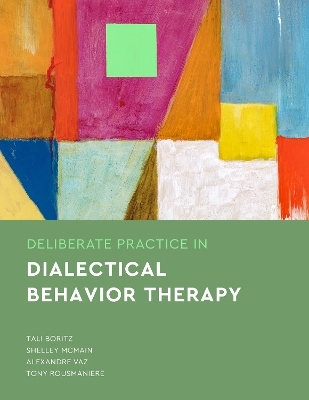
Deliberate Practice in Dialectical Behavior Therapy
American Psychological Association (Verlag)
978-1-4338-3789-0 (ISBN)
- Titel z.Zt. nicht lieferbar
- Versandkostenfrei
- Auch auf Rechnung
- Artikel merken
Deliberate practice exercises allow students and trainees to rehearse foundational dialectical behavior therapy (DBT) skills and strategies to respond effectively and flexibly to diverse, complex clinical presentations and situations.
Each book in the Essentials of Deliberate Practice series contains customized role-playing exercises in which two trainees act as a client and a therapist, switching back and forth under a supervisor's guidance. The trainee playing the therapist improvises appropriate and authentic responses to client statements organized into three difficulty levels—beginner, intermediate, and advanced—reflecting common issues encountered by DBT practitioners.
The first 12 exercises each focus on a single skill, such as validating clients, encouraging commitment to therapeutic goals, teaching problem-solving skills, and working with clients in crisis or expressing suicidal ideation. Following these are two comprehensive exercises—an annotated transcript and free-form mock therapy sessions—in which trainees integrate essential skills into a single DBT session.
Step-by-step instructions guide participants through the exercises, identify criteria for mastering each skill, and explain how to monitor and adjust difficulty. Guidelines to help trainers and trainees get the most out of training are also provided.
Tali Boritz, PhD, CPsych, is an assistant professor in the Clinical Psychology Program in the department of psychology at York University and a collaborator scientist in the Borderline Personality Disorder (BPD) Clinic at the Centre for Addiction and Mental Health (CAMH) in Toronto, Canada. She specializes in the treatment of BPD and complex trauma. Her research at York University and CAMH focus on psychotherapy process and outcome and psychotherapy training in BPD treatments. Shelley McMain, PhD, CPsych, is an associate professor in the department of psychiatry at University of Toronto, head of the Borderline Personality Disorder Clinic and a Clinician Scientist at the Centre for Addiction and Mental Health (CAMH), and cofounder of the Centre for MindBody Health in Toronto. She currently serves on the DBT Strategic Planning Committee and on the Scientific Advisory Board of the Linehan Institute. Recognized as a leader in dialectical behavior therapy in Canada and internationally, Dr. McMain conducts research in DBT, personality disorders, emotion regulation, suicide and self-harm, substance abuse, and psychotherapy process and outcomes. Alexandre Vaz, PhD, is director of training at the Sentio Marriage and Family Therapy graduate program and Sentio Counseling Center. He has authored many books on deliberate practice and psychotherapy training and is coeditor of the book series The Essentials of Deliberate Practice (APA Books). Dr. Vaz has held multiple committee roles for the Society for the Exploration of Psychotherapy Integration (SEPI) and the Society for Psychotherapy Research (SPR). He is founder and host of “Psychotherapy Expert Talks,” an acclaimed interview series with distinguished psychotherapists and researchers. Tony Rousmaniere, PsyD, is program director of the Sentio Marriage and Family Therapy graduate program, and executive director of the Sentio Counseling Center. He has authored many books on deliberate practice and psychotherapy training and is coeditor of the book series The Essentials of Deliberate Practice(APA Books). In 2017, Dr. Rousmaniere published the widely cited article in The Atlantic Monthly, “What Your Therapist Doesn’t Know.” Dr. Rousmaniere supports the open-data movement and publishes clinical outcome data at drtonyr.com. He is president of Division 29 of APA.
Series Preface
Tony Rousmaniere and Alexandre Vaz
Acknowledgments
Part I. Overview and Instructions
Chapter 1. Introduction and Overview of Deliberate Practice and Dialectical Behavior Therapy
Chapter 2. Instructions for the Dialectical Behavior Therapy Deliberate Practice Exercises
Part II. Deliberate Practice Exercises for Dialectical Behavior Therapy Skills
Exercises for Beginner Dialectical Behavior Therapy Skills
Exercise 1. Establishing a Session Agenda
Exercise 2. Validation
Exercise 3. Reinforcing Adaptive Behaviors
Exercise 4. Problem Assessment
Exercises for Intermediate Dialectical Behavior Therapy Skills
Exercise 5. Eliciting a Commitment
Exercise 6. Inviting the Client to Engage in Problem Solving
Exercise 7. Skills Training
Exercise 8. Modifying Cognitions
Exercise 9. Informal Exposure to Emotions
Exercises for Advanced Dialectical Behavior Therapy Skills
Exercise 10. Coaching Clients in Distress
Exercise 11. Promoting Dialectical Thinking Through Both–And Statements
Exercise 12. Responding to Suicidal Ideation
Comprehensive Exercises
Exercise 13. Annotated Dialectical Behavior Therapy Practice Session Transcript
Exercise 14. Mock Dialectical Behavior Therapy Sessions
Part III. Strategies for Enhancing the Deliberate Practice Exercises
Chapter 3. How to Get the Most Out of Deliberate Practice: Additional Guidance for Trainers and Trainees
Appendix A. Difficulty Assessments and Adjustments
Appendix B. Deliberate Practice Diary Form
Appendix C. Sample Dialectical Behavior Therapy Syllabus With Embedded Deliberate Practice Exercises
References
Index
About the Authors
| Erscheinungsdatum | 01.12.2022 |
|---|---|
| Reihe/Serie | Essentials of Deliberate Practice Series |
| Verlagsort | Washington DC |
| Sprache | englisch |
| Maße | 216 x 279 mm |
| Themenwelt | Geisteswissenschaften ► Psychologie ► Klinische Psychologie |
| Medizin / Pharmazie ► Medizinische Fachgebiete ► Psychiatrie / Psychotherapie | |
| ISBN-10 | 1-4338-3789-7 / 1433837897 |
| ISBN-13 | 978-1-4338-3789-0 / 9781433837890 |
| Zustand | Neuware |
| Haben Sie eine Frage zum Produkt? |
aus dem Bereich


